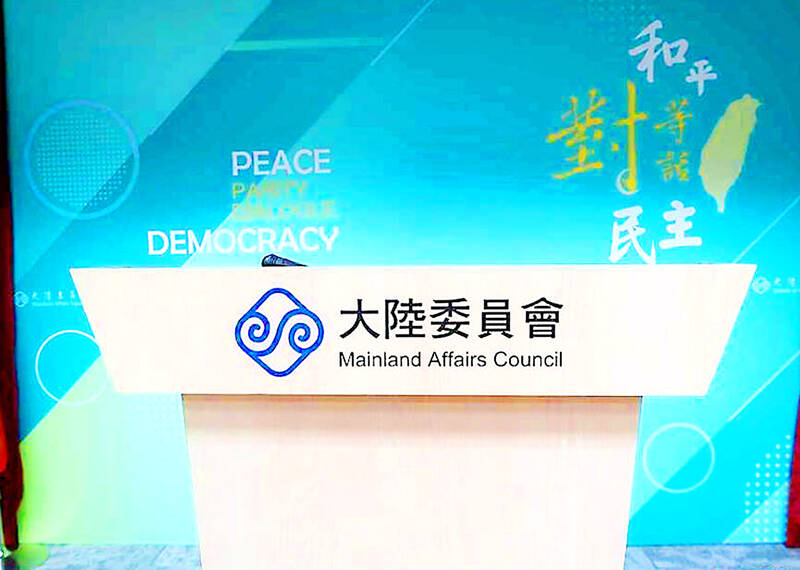The Mainland Affairs Council (MAC) is to tighten regulations regarding Taiwanese holding official posts in China’s military, government or political parties, adding hundreds of Chinese groups and agencies to its prohibited organizations list.
Article 33 of the Act Governing Relations Between the People of the Taiwan Area and the Mainland Area (臺灣地區與大陸地區人民關係條例) stipulates that Taiwanese cannot hold any position or become a member of Chinese political parties, military, administration or organizations of any political nature listed by the council.
Those who contravene the regulation face a fine of NT$100,000 to NT$500,000, the act says.

Photo: Chung Li-hua, Taipei Times
The Chinese system of government is complex and the organizational structure sometimes changes, making it impossible to compile an exhaustive list of banned agencies and organizations, the council said.
Beijing has undergone restructuring several times in the past two decades, so it is increasingly difficult for regulations to remain in line with the current situation, it said.
To prevent China from circumventing Taiwan’s regulations, the amended act would ban Taiwanese from holding posts in China’s military, government or any political party and political organization that “is linked to national identity or loyalty,” “conducts united front work against Taiwan” or “is considered a threat to the national security or interests” of Taiwan.
Beijing has in the past few years increased its efforts to promote integration and annexation of Taiwan, as well as to use Taiwanese to influence public opinion, the MAC said.
By recruiting Taiwanese to positions not listed by the council, China aims to create the illusion of cross-strait integration, establish a model for its “united front” campaign and affect public morale, it said.
The amendments are designed to protect national security and stability, and prevent Chinese “united front” efforts and other attempts to infiltrate and divide Taiwan, it said.
The banned list is to include the Association for Relations Across the Taiwan Straits, the All-China Federation of Taiwan Compatriots and the Confucius Institute, as well as the People’s Daily (人民日報), the Qiushi Journal (求是雜誌) and the Guang Ming Daily (光明日報).
It would also include the Chinese People’s Liberation Army Academy of Military Sciences, the China Academy of Engineering Physics, the Revolutionary Committee of the Chinese Kuomintang, the China Democratic League, the China National Democratic Construction Association, the China Association for Promoting Democracy, the Chinese Peasants’ and Workers’ Democratic Party, the China Zhi Gong Party, the Jiusan Society and the Taiwan Democratic Self-Government League.

CHAOS: Iranians took to the streets playing celebratory music after reports of Khamenei’s death on Saturday, while mourners also gathered in Tehran yesterday Iranian Supreme Leader Ayatollah Ali Khamenei was killed in a major attack on Iran launched by Israel and the US, throwing the future of the Islamic republic into doubt and raising the risk of regional instability. Iranian state television and the state-run IRNA news agency announced the 86-year-old’s death early yesterday. US President Donald Trump said it gave Iranians their “greatest chance” to “take back” their country. The announcements came after a joint US and Israeli aerial bombardment that targeted Iranian military and governmental sites. Trump said the “heavy and pinpoint bombing” would continue through the week or as long

TRUST: The KMT said it respected the US’ timing and considerations, and hoped it would continue to honor its commitments to helping Taiwan bolster its defenses and deterrence US President Donald Trump is delaying a multibillion-dollar arms sale to Taiwan to ensure his visit to Beijing is successful, a New York Times report said. The weapons sales package has stalled in the US Department of State, the report said, citing US officials it did not identify. The White House has told agencies not to push forward ahead of Trump’s meeting with Chinese President Xi Jinping (習近平), it said. The two last month held a phone call to discuss trade and geopolitical flashpoints ahead of the summit. Xi raised the Taiwan issue and urged the US to handle arms sales to

State-run CPC Corp, Taiwan (CPC, 台灣中油) yesterday said that it had confirmed on Saturday night with its liquefied natural gas (LNG) and crude oil suppliers that shipments are proceeding as scheduled and that domestic supplies remain unaffected. The CPC yesterday announced the gasoline and diesel prices will rise by NT$0.2 and NT$0.4 per liter, respectively, starting Monday, citing Middle East tensions and blizzards in the eastern United States. CPC also iterated it has been reducing the proportion of crude oil imports from the Middle East and diversifying its supply sources in the past few years in response to geopolitical risks, expanding

Pro-democracy media tycoon Jimmy Lai’s (黎智英) fraud conviction and prison sentence were yesterday overturned by a Hong Kong court, in a surprise legal decision that comes soon after Lai was jailed for 20 years on a separate national security charge. Judges Jeremy Poon (潘兆初), Anthea Pang (彭寶琴) and Derek Pang (彭偉昌) said in the judgement that they allowed the appeal from Lai, and another defendant in the case, to proceed, as a lower court judge had “erred.” “The Court of Appeal gave them leave to appeal against their conviction, allowed their appeals, quashed the convictions and set aside the sentences,” the judges